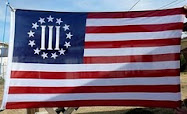I have said it before and I say it again, the Constitution is false holy writ for a false religion of Statism. It is inherently hypocritical because its interpretations are not immutable and thus change with each passing generational crises. It gives nothing more than a false legitimacy to the majority to oppress the minority with the hubris of "our might makes right because we followed the law!" The Constitution is also nothing more than the third failed attempt of representative self government by a people who espoused the five foundational premises of the Declaration of Independence.
The Constitution secures few rights and restrains government minimally.
~ Mit
From LewRockwell.com:
Who Killed the Constitution?
by Thomas E. Woods, Jr.Today is the official release date for Who Killed the Constitution? The Fate of American Liberty from World War I to George W. Bush (Random House/Crown Forum), the book I wrote with Kevin Gutzman, the New York Times bestselling author of The Politically Incorrect Guide to the Constitution.
 In a sense, our book states the obvious: the United States government today is restrained not by the Constitution but simply by a sense of what it can get away with.
In a sense, our book states the obvious: the United States government today is restrained not by the Constitution but simply by a sense of what it can get away with.
But ours is not the standard right-wing lament about the emasculation of the Constitution at the hands of liberal judges, though such judges receive in our pages none of the superstitious reverence Americans are taught to have for the judiciary. (Mencken once described a judge as merely a law student who graded his own examination papers.) To the contrary, we suggest that all three branches of the federal government, either separately or in collusion, have been responsible for turning the Constitution into just a museum piece, and that conservatives and liberals alike have much to answer for as well.
To hear the Left tell it, the Bush administration is a strange aberration in our history. But bad as the Bush administration is, it is not an aberration, and most of its deformations of the Constitution enjoy bipartisan support. The Democrats have made and will doubtless continue to make equally bold claims for presidential war powers, and Bill Clinton sought measures similar to the Patriot Act in the 1990s.
As I wrote in last year’s 33 Questions About American History You’re Not Supposed to Ask, "The philosophy of an activist, vigorous executive possessing inherent powers that override congressional prerogative is not a recent development at all, but has been an integral part of the thinking of most of the presidents our historians teach us to admire. Demonizing only one president, as the left is by and large still doing in 2008, is far too timid. So many others merit the same treatment."
We show that Harry Truman’s seizure of the steel mills in 1952, for which the Supreme Court rebuked him (though not as sweepingly as the standard account suggests), was based on the same philosophy of the presidency that nearly all twentieth-century presidents held, and was likewise no aberration at all.
Woodrow Wilson is another good example, for more reasons than we can chronicle in this book. As Bill Kauffman puts it, Wilson makes George W. Bush look like a pro bono lawyer for the ACLU. In tandem with draconian penalties for the most harmless statements about the Great War, voluntary enforcement agencies with names like the Sedition Slammers, the Terrible Threateners, and the Boy Spies of America sprang up across the country. Eugene V. Debs made the best of his situation, collecting a million votes for president in the 1920 election while in prison for giving a speech. (A popular campaign button read, "For President: Convict No. 9653.") All three branches of government heartily approved.
MORE HERE

Thomas E. Woods, Jr. [view his website; send him mail] is senior fellow in American history at the Ludwig von Mises Institute .
























